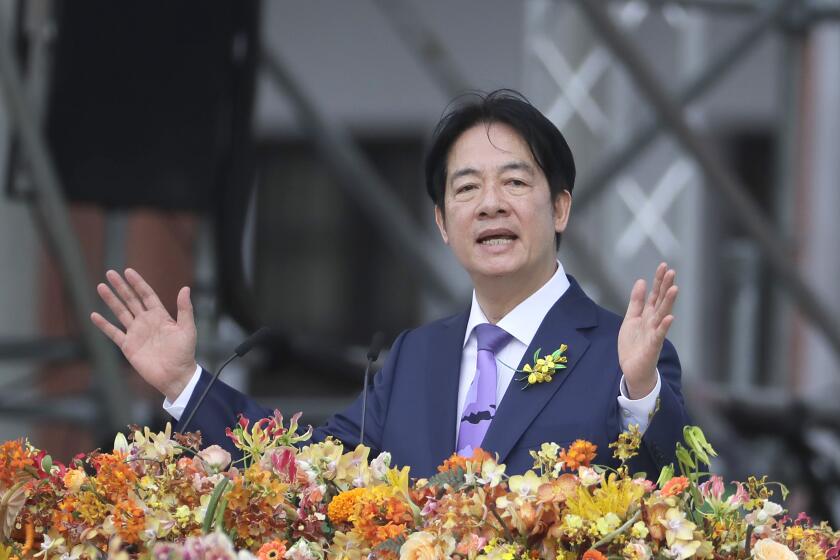COLUMN ONE : Japan’s Old Ties Hard to Break : Many voters favor reform but benefit from pork-barreling and patronage that dates back to the feudal lords. Such mixed feelings may temper the mood for change in Sunday’s crucial election.
Kenzaburo Hara is a master of traditional Japanese politics. At 86, he is the oldest candidate in this campaign season and has 18 reelections and 47 years of service under his belt.
As he delivers a speech before mostly elderly voters in Hyogo prefecture in western Japan, he reminds them of bridges built, roads paved, favors rendered.
Never mind his policies; what is operative here is the political patronage that has bound his constituents to him in giri-ninjo, the web of duty and human relationships that still form lifelong allegiances today, just as they governed feudal lords, samurai and peasants centuries ago.
But Hara, a Liberal Democratic Party member in the lower house of Parliament, is facing the toughest reelection campaign of his career. Yuriko Koike is a key reason why. She is 40, trilingual and telegenic, a former newscaster who won election to the Parliament’s upper house last year. She stresses not patronage but policy as the premier campaigner of the upstart Japan New Party, a neo-conservative alternative to 38 years of political domination by the Liberal Democrats.
On the campaign trail, Koike bags the standard stump speech and sets up a talk-show format with a fellow party candidate in front of a busy train station. They chat about political reform in a plain, entertaining and decidedly new campaign style.
As Japanese voters go to the polls Sunday in their most important parliamentary election in four decades, nowhere is the contrast between old and new more pronounced than in this battle between Hara and Koike.
Accentuating this contrast is a string of scandals, largely bred by the traditional system of patronage, that has splintered the LDP, led to its loss of a majority and helped create new parties and political allegiances in the biggest clamor for change since the end of World War II.
“It is no longer progressive versus conservative, left versus right,” said Sakihito Ozawa, 37. He is a disgruntled former LDP staff member running as a Japan New Party candidate in Yamanashi prefecture, the semirural region once ruled by former political kingpin Shin Kanemaru until he was indicted for failing to pay millions of dollars in taxes.
“This is a battle between old politics and new politics, between the old-style politics of boss and follower and our new style of free elections based on voters making individual decisions,” he said.
But as the voters of Hyogo and Yamanashi illustrate, the change occurring across Japan is not as sweeping as Ozawa suggests or the media have indicated.
Indeed, earlier predictions of a stunning LDP loss have been tempered recently as polls show that the dominant party may, in fact, lose only a few seats; the Japan New Party’s expected gains, instead, are anticipated to come largely out of the hides of the Socialists.
Many analysts here predict that the election will be a political turning point for Japan as voters find they actually feel comfortable having their government run by neo-conservative alternatives to the LDP, such as the Japan New Party, Renewal Party and New Party Harbinger. By turning to these groups, voters will lay the groundwork for a genuine two-party system.
That process, however, could take years, and not just because of Japanese caution toward change or the kind of political apathy and skepticism about all politicians found in many industrial democracies.
The real reason is that the patronage politics at which the LDP excels are deeply embedded in Japanese society. However much they may give rise to what Westerners consider corruption, they will not be easily replaced. This all goes to show, experts say, that although Japan may look like a modern, almost American-style democracy, there are deeper, cultural factors at play here.
Political scientist Nobutaka Ike once described Japan as having a “patron-client democracy.” It is a system in which people do not necessarily vote for a party with policies they believe in, but a personal patron who will care for them and their community’s needs in exchange for a fierce, sometimes blind loyalty.
Suehiro Yasuda, a Kawanishi city councilman volunteering in Hara’s campaign, is almost never asked about policy, which in Japan is mainly crafted by bureaucrats anyway. His constituents ask him to advise them on divorce, explain the inheritance laws, introduce them to funeral companies, find them public housing. They ask him to find jobs for children, fix traffic tickets, play matchmaker and arrange priority hospital treatment.
In Yamanashi, Kanemaru brought a lucrative project for a new, high-tech train and enriched his hometown of Shimane even more. The town’s population is only 18,114. But it has a new art museum, an impressive brick hall for the agriculture association, a modern post office, a new clinic, and, for Japan, a good-sized community library with an alpine-style roof.
“The more indebted people become to you, the more they think of you as a god,” said Shigeo Omae, a 15-year prefectural council member who is Koike’s campaign manager.
Come election time, many politicians also take care of their constituents in other ways--with money. Cash is sometimes stuffed in rice balls and handed to voters. On Awaji Island in Hyogo prefecture, some voters sit at the stoop, waiting for visiting candidates to slip money under the floor cushions, said Shinya Tomomatsu, campaign manager for Takako Doi, former Socialist chairwoman who is also running against Hara and Koike.
More commonly, many politicians dole out money to village chiefs and bosses of powerful supporter groups called koenkai. In the city of Nishinomiya near Osaka, there are more than 300 neighborhood districts headed by bosses who require an average of $930 each to deliver the vote, Tomomatsu said.
The Japanese government first created the neighborhood group system before World War II to keep an eye on anti-war activists; although the structure was officially abolished after the war, the divisions informally remain in many areas, he said.
Politicians also take supporters on group trips to hot spring resorts or give out gifts of golf club covers, ashtrays and cups.
All of which increases the need for campaign cash. Although Japanese law imposes strict limits on the amount of the time and spending for a campaign--$320,000 and two weeks--sources say it is clear that the LDP, which excels in the patronage system, typically spends hundreds of thousands more in each of the races in which it is involved. In Hyogo, Koike reports a $187,000 campaign budget; Doi reports $140,000; Hara declined to disclose figures. (All three campaigns said they don’t give money to voters.)
In return for favors, politicians are repaid with votes and political support at election time. The political bosses mobilize their members and deliver their votes. Corporations that got preferential public contracts during the year may respond with political contributions and by sending employees to work as campaign volunteers.
“In this Confucian society, it’s a custom to pay something back when you receive a favor,” Tomomatsu said. “If you receive a favor and don’t return anything, you’re seen as ungrateful. Also, if someone returns a favor and you don’t, you’ll lose out to the competition.”
As a result, even a political reformist such as Tomomatsu is unsure where the line should be drawn between a virtuous custom and a corrupt practice. The quid pro quo that serves as a corruption yardstick in the West doesn’t fit here, since the point of the custom is quid pro quo.
That’s one reason the seemingly endless political scandals in Japan don’t create the same level of public outrage they might in the West--or why politicians “disgraced” by scandal are routinely reelected. Kanemaru, for instance, still commands sympathy and even respect in his district, despite charges of tax evasion and television footage of piles of gold bars secretly hoarded in his office.
Yasushi Horiguchi, for instance, wistfully recalls the former kingpin’s pull. Horiguchi, 46, the owner of a construction equipment leasing firm, says business is terrible. “Look at all those cranes parked there. Nobody is building,” he complains. “When Kanemaru was there, mayors and governors could go to him when they wanted roads or bridges. Whatever you can say about him, he had power.”
Things appear to have changed little in Yamanashi despite Kanemaru’s demise. His well-oiled support network, largely construction companies and big business, remains intact. It is being inherited by a nominally independent candidate, Shomei Yokouchi--another politician in the traditional mold. Yokouchi is a former construction ministry official and is expected to be absorbed by the LDP if elected.
As Yokouchi drives through the region’s valleys and paddy fields in his white campaign car topped with giant speakers, a 60-year-old woman in muddy boots drops her wheelbarrow and waves. “We don’t think what the LDP has done is good,” she says, referring to allegations of its corruption. “But we have to think of the region. There aren’t many of us, so we have to band together and support a candidate who will help us.”
In Hyogo, restaurant owner Koji Matsui figures the scandals are an inevitable consequence of the patronage system. He himself is indebted to a Socialist politician, who introduced him to the owner of the building in which his restaurant is located. In return, he said he was asked to cheat on his taxes and to give as a kickback whatever money he saved as a result. He took his accountant’s advice not to do this.
But Matsui was neither outraged nor surprised by the request. Nor does he think many of his fellow voters have a burning desire to change a system that, whatever its flaws, takes care of people.
Matsui may be right. A Yomiuri newspaper poll this week showed that although every political party has made anti-corruption reform its top priority, the public has not. Medical care, welfare and pension issues are top concerns. Next are high prices. Political reform is third. Only 25% of those surveyed want LDP power replaced by opposition forces; more than 60% expect no big change.
Of course, some voters are fed up with corruption and intend to abandon the LDP. Hirahara Hamamatsu, an electronics engineer near Yamanashi, is one. “Up to now, bad customs have prevailed,” he said. “It was like a lord and his subjects. The lower people didn’t say anything. I think it would be good for the LDP to lose power once.”
Among those leading the charge for change are Koike and her Japan New Party, headed by former Gov. Morihiro Hosokawa. Rather than patronage, they offer policies that, if enacted, would result in big changes.
They say they would open Japan’s markets, including lifting the ban on imported rice; shift power to localities from the central bureaucracy that has steered Japan for decades; allow Japan’s Self-Defense Forces to more freely participate in U.N. peacekeeping operations; ban corporate campaign contributions, limit individual donations to $90 a year and impose harsh penalties for violators, including a loss of voting rights.
These candidates bypass old-boy networks and skillfully use the media to get free exposure to millions of voters. To win coverage, Koike is not beneath gimmicks, campaigning, for instance, carrying stuffed animals that remind voters of their favorite baseball team. To underscore her humility and traditional values, she showed up at a Tokyo festival in a cotton kimono. She appeared on Larry King’s television show, which attracted wide publicity when broadcast from here; she hobnobbed with Hillary Rodham Clinton when the First Lady was in Tokyo for the recent economic summit.
“We have to build new Japanese politics,” Koike says in her polished pitch. “This coming election is the beginning of the end of the old way.”
Despite her political inexperience, Koike is expected to run second behind Doi in a field of seven candidates for five seats. Hara, who needs to win just one more three-year term to achieve his dream of a half-century of service, is considered to be in serious political trouble.
So he is doing what any master of traditional Japanese politics would do: fighting the new with the old, appealing to the giri-ninjo spirit of obligation and sympathy that remain in the depths of Japanese hearts.
Before whirring TV cameras, Hara bows his head and puts his palms together in supplication. “I’m in danger,” he pleads. “Please save me.”
More to Read
Start your day right
Sign up for Essential California for news, features and recommendations from the L.A. Times and beyond in your inbox six days a week.
You may occasionally receive promotional content from the Los Angeles Times.







